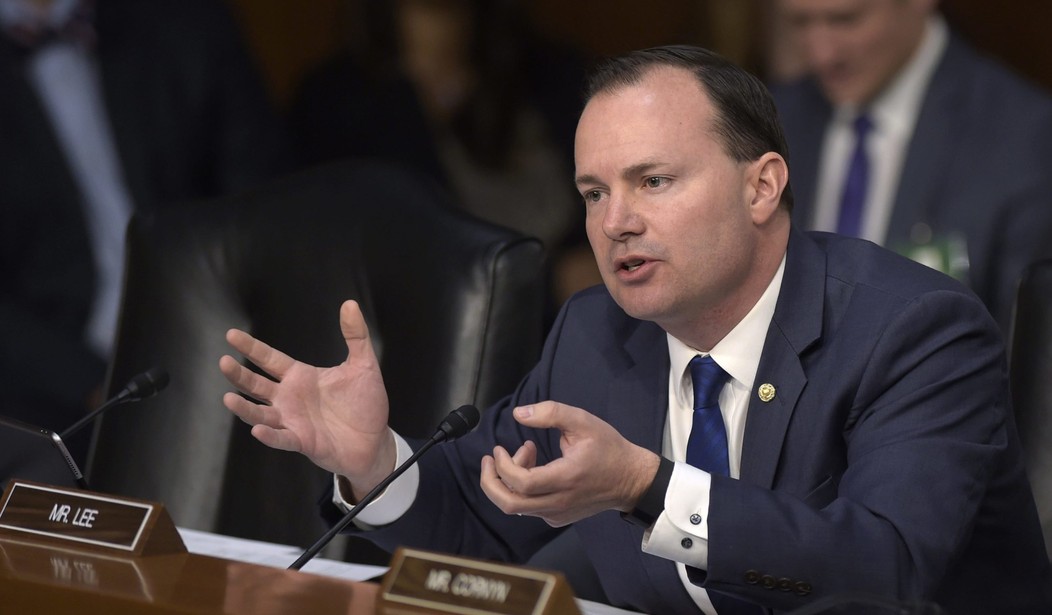WASHINGTON – Sen. Mike Lee (R-Utah) said the federal government has contributed to the opioid crisis and caused “substantial harm” over time.
“When faced with a crisis of this particular magnitude, it is easy to say that maybe the solution could be found in a new raft of government programs. I don’t offer any easy solutions like this today. In a way I wish it were that easy. I wish we could do that. I wish we could push this button to say ‘end this crisis.’ This is too complex and too intricate an issue for knee-jerk responses,” Lee said during a recent American Enterprise Institute event on “The Numbers Behind the Opioid Crisis.”
“There is strong evidence that the government has itself done substantial harm by, among other things, paying for a flood of pain pills through Medicaid and the Medicare prescription drug benefit,” he said. “Before we jump into any other government-funded solution, we should reckon with the damage that this kind of mentality and this kind of programmatic response through our nation’s capital has already caused.”
The Centers for Disease Control and Prevention reported last week that drug overdoses killed 63,632 Americans in 2016, and nearly two-thirds of these deaths involved a prescription or illicit opioid. Death rates from synthetic opioid overdoses, with substances such as fentanyl, increased in 21 states, with 10 states doubling their rates from 2015 to 2016.
Lee said the U.S. has to “recognize that culture matters” when it comes to drug addiction.
“The medical community has already started to change for the better, as doctors have created and in some cases re-established norms against the reckless prescribing of opioids. As a result, opioid prescriptions have been declining for the last several years,” he said.
“Fewer prescriptions means fewer loose pills that can go into general circulation and end up creating new addicts. So, these things represent a tangible positive step in the right direction. The harder task, really, will be to change the broader culture within American communities and families to make them more resilient to drugs,” he added.
While the number of deaths due to opioids is often discussed in the media and “is plain for all to see,” constituting “a fresh horror story … on the evening news every single night almost regardless of where you live in America,” Lee emphasized that the public and policymakers should not “forget about the toll that addiction takes in other forms on the living.”
“Across the country, foster care systems are overwhelmed by what you might describe as children who are effectively refugees from opioid-addicted parents and households. Babies are born dependent on drugs that may one day claim the lives of their parents,” he added.
Lee continued, “Countless other people spend sleepless nights praying that they will get back the husband, the wife, the son, or the daughter they seem to have lost to opioids. These examples show that, far from being a victimless crime, drug abuse itself produces countless victims, it corrodes users, households, communities and entire countries alike.”
Lee encouraged Americans to work together on a “personal level” to build “resilient” families and communities as a way to fight the opioid crisis.
He mentioned the work of treatment organizations in Utah such as Odyssey House, which “helps to divert substance abusers away from the criminal justice system through drug courts and other programs into a supportive environment where they can detox and, just as importantly, prepare for life outside of addiction.”
“Odyssey House has worked hand-in-hand with local government and civic groups to serve the local community and they’ve done so with a great deal of success,” Lee said.
He also cited the Other Side Academy in Utah, an organization that works with individuals in recovery on a “comprehensive, two-year residential program” that offers “vocational training, education, peer counseling and mentoring, leadership training and transitional services.”
“These are just two programs that are making a difference in my state, in Utah, and the examples could be multiplied,” Lee said.









Join the conversation as a VIP Member